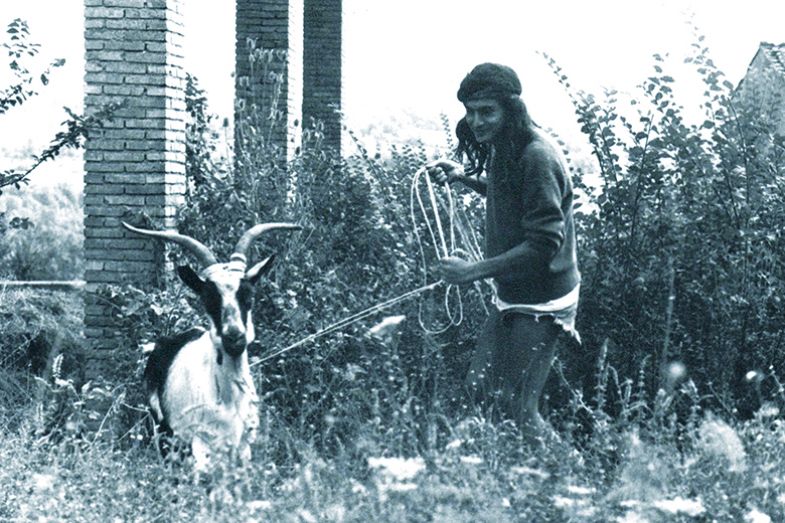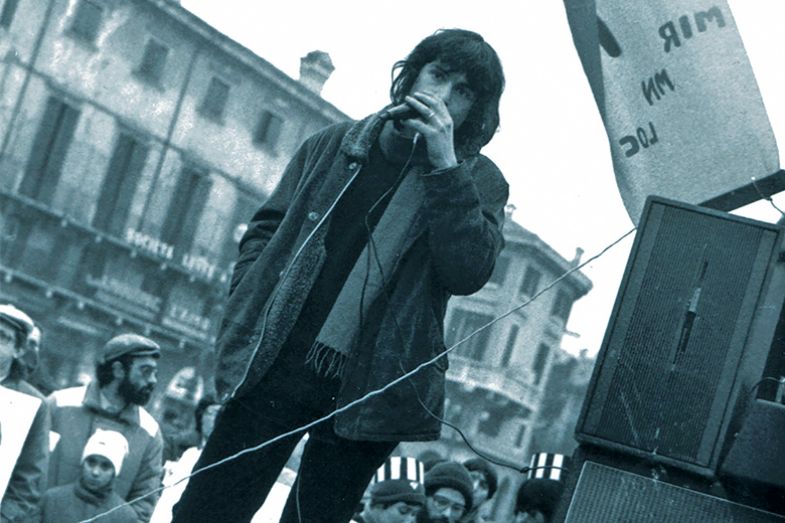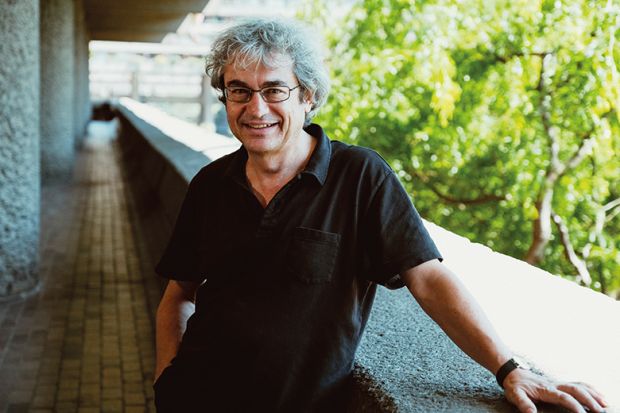“It took me almost twice as much time to graduate as my colleagues,” reflects Carlo Rovelli, the Italian theoretical physicist whose 2015 book, Seven Brief Lessons on Physics, sold more than 1.3 million copies. Now director of the quantum gravity research group at the Centre de Physique Théoretique in Marseilles, as well as a visiting professor at Western University in Canada, Rovelli did not receive his honours degree until he was 25 or his PhD until he was 30. “In some countries, this would just kill a career,” he says.
Rovelli’s undergraduate years were nonetheless busy, not least with activism. He was swept into radical politics while studying in Bologna in the 1970s, as leftist students clashed with the city’s communist leadership. He helped to run the subversive Radio Alice station favoured by protesters and was later investigated for contributing to Fatti Nostril, a secretly printed collection of political writings. He was also arrested for refusing to do military national service in the 1980s.
“I was interested in everything in my youth: philosophy, reading, travelling. Science and physics specifically came pretty late,” Rovelli recalls. “At the beginning, I was not particularly attracted by science because the exams were a bit boring. It was only when I got to 20th-century physics that it really clicked, and then it came naturally. I didn’t have to make an effort to focus: it captured my curiosity. It attracted me, like a black hole, and I just wanted to learn more.”
Rovelli is in good company among scientific mavericks who eventually came good. His latest book, Helgoland: The Strange and Beautiful Story of Quantum Physics, which was published in paperback this month, opens with the story of how the 23-year-old Werner Heisenberg, suffering from severe hay fever, retreated alone to the pollen-less (and tree-less) island of Helgoland in the North Sea and just thought very, very hard. Another crucial early step in quantum physics was taken by Edwin Schrödinger, we read, “during a getaway with a secret lover in the Swiss Alps”.
In Seven Brief Lessons, which became one of the fastest-selling science books of all time, Rovelli makes a point of starting with the young Einstein “spen[ding] a year loafing aimlessly”. Rovelli himself spent a year hitch-hiking and sleeping rough around the US and Canada: “You don’t get anywhere by not ‘wasting’ time,” he writes. “It is thus that serious scientists are made.” Rovelli also describes how he first explored relativity on the beach “with the help of a book that had been gnawed at the edges by mice, because at night I’d used it to block the holes of these poor creatures in the rather dilapidated, hippy-ish house on an Umbrian hillside where I used to take refuge from the tedium of university classes in Bologna”.
Engaging seriously with theoretical physics, Rovelli suggests in Helgoland, is “an almost psychedelic experience”, since it asks us to “accept that reality may be profoundly other than we had imagined”. The book explores the disputes and friendships behind the discovery and development of quantum mechanics and is intended to take the famously difficult theory “beyond the restricted circles of theoretical physicists and philosophers, to deposit its distilled honey, sweet and intoxicating, into the whole of contemporary culture”. Hailed as Rovelli’s greatest book so far, it led John Banville, the Booker Prize-winning novelist, to exclaim that “physics has found its poet”.

“There is not a right way of doing science,” Rovelli tells Times Higher Education. “There are many ways of doing science. There are great scientists who are very narrow-minded and incredibly focused, just looking at one particular detail and getting fantastic theorems and results, making a great contribution to humankind. Then there are those who are very good at organising big experiments and dealing with money.”
Yet Rovelli is much more interested in mavericks who have wide-ranging interests and dare to ask the biggest questions. And although he acknowledges that “the revolution of my generation failed”, he still thinks it played an important role in pushing him in that direction.
“My fascination with quantum mechanics was precisely because it was such a radical and revolutionary form of thinking,” he says. “Science needs rebellious people.” Even his experiences with psychedelic drugs proved useful. “I don’t think there’s a direct connection between taking LSD in London in the 1970s and doing science 20 or 30 years later,” he reflects. “But drugs give you experience of an idea which is hard to get at intellectually: that things might be completely different from what we usually assume.”
“The moments when I found that experience useful were when I was debating with colleagues about the nature of time,” Rovelli continues, since “the psychedelic experience helps one free oneself from…the idea that something is obvious because we have always seen it this way”.
The possibility of scientific revolution remains important to him. Although broadly supportive of the current university system, Rovelli is well aware that we can find “sclerotisation” in all areas of knowledge, “because once a group takes power, it keeps power”. In the 14th century, Dante “spent several years in my hometown of Verona and gave a lecture, because he was trying to get a teaching job – and failed. And now he’s remembered as the greatest intellectual of the Italian Middle Ages. [But] he was not hired because he was not part of the clique.”
The tendency of “power groups" to reproduce themselves "freezes the need for flexibility” of thought, Rovelli goes on. “Young students come in and get schooled in a direction of thinking that might not be productive – it survives because old people are attached to it and don’t want to give it up. That has always happened and is happening today.”
In his own case, Rovelli remembers “being strongly advised by a number of senior people to go in this or that direction” after his undergraduate degree and then his PhD, because those directions were "fashionable and had groups working on them. But I thought that the interesting problems were not the ones people were working on”, such as “anomalies in quantum field theory”. He preferred to tackle “the major open problem” of quantum gravity. “In the 1970s, you could count on two hands the number of people working in the field,” Rovelli says. But those few did include Stephen Hawking at the University of Cambridge and Chris Isham at Imperial College London, and Rovelli thought they were “taking science ahead in an interesting direction”.
When he came to Imperial himself, Rovelli discovered “a sense of doing something which was not mainstream. It resonated with my rebelliousness.” He particularly liked the wide variety of his colleagues and the way that “people who were dressed in white shirts and ties and people who were barefoot” could work together happily in the same few rooms.

In the event, it turned out that Rovelli had backed one of the right horses, and there are now hundreds of people working on quantum gravity. So what lessons does he draw from his own experience and that of his earlier scientific heroes?
He is wary of “a style of doing science which is careful, avoiding any mistakes – that doesn’t lead ahead”. And he also has reservations about the ways that “young students in physics are either put in a big experimental group and do what they are told or they do theory and they study a little piece and try to do something with that”. To make real advances, Rovelli believes, “you have to have a large picture and know a lot...One can contribute to a field by getting completely immersed in it, learning all that has been said and all the mistakes which have been made – and it is only at that point that maybe one sees a crack, a little passage to do something no one else has done.”
Part of the problem, as Rovelli describes it, is that “there are not many people in the entire science community who ask the key question of what we should really do. Many people just follow, like in an army – a soldier doesn’t ask why we are doing something this way rather than that. They wait for someone to give an order. It’s a few generals who decide what to do. But science cannot work with a few generals. It works with brains all around that should come up with ideas.”
So his advice to young scientists is, where possible, to “take your time, go slowly and don’t hurry. Read a lot – and just follow your curiosity. Don’t think you have to just focus on one thing. Follow your curiosity and, if your curiosity is large, just be large."
He also advocates cultivating wider interests. "It’s hard to find a major physicist of the past who wasn’t deeply interested in philosophy...If you are curious about the brain, read about neuroscience. If you are curious about proteins and bioscience, read about that.”
Asked about how realistic this is in today’s climate, Rovelli points to the example of his fellow Italian scientist Giorgio Parisi, based at the Sapienza University of Rome, who shared the 2021 Nobel Prize in Physics: “He began in particle physics and then got interested in the flocks of birds flying over the university in Rome and started studying that, and then spin glass and condensed matter, where there’s some very complex mathematics, and that’s what led him to the Nobel prize…He was curious and followed his curiosity. That’s what good scientists do – they trust themselves and their curiosity.”
Today, of course, we are living in an era of “big science”, typified by the vast international teams working at Cern, the European Organisation for Nuclear Research, and other major experimental institutions. Rovelli admits that such approaches “have been very productive – what was done with the Standard Model with the Higgs [boson] was great, though they have also led to some disappointments”.
As an example from his student years, he cites “a theory that was called SU(5), a beautiful theory and a fantastic simplification of the Standard Model. It made a specific prediction, that the proton is not stable. Big experiments were put together to test the decay of the proton and see if this was the right theory. I know scientists who spent their lives doing that. But the proton just doesn’t decay in the timespan and with the probability that the theory predicts. So the theory was wrong!”
It is in the nature of scientific progress, as Rovelli sees it, that it proceeds through such disappointments as well as successes: “For the people involved in it, it was quite a big disappointment. If they had found proton decay – if God had different ideas about nature and had liked that theory – it would have been a fantastic verification of a beautiful theory. But it hasn’t. That’s the way science works.”
So while the Large Hadron Collider “has been a great tool and we have learned a lot from those machines, it’s essential to keep in mind that those are not the only tools we have for researching nature...We want to be careful that excessive hierarchical structures don’t close off alternatives.”
Perhaps, on the back of Rovelli's book, Helgoland should brace itself for an unlikely tourist wave of physics researchers on leave from Cern seeking to recreate the big, hard free thinking of Heisenberg’s day. It could be quite a collision.
POSTSCRIPT:
Print headline: ‘You don’t get anywhere by not “wasting time” ’
Register to continue
Why register?
- Registration is free and only takes a moment
- Once registered, you can read 3 articles a month
- Sign up for our newsletter
Subscribe
Or subscribe for unlimited access to:
- Unlimited access to news, views, insights & reviews
- Digital editions
- Digital access to THE’s university and college rankings analysis
Already registered or a current subscriber? Login










